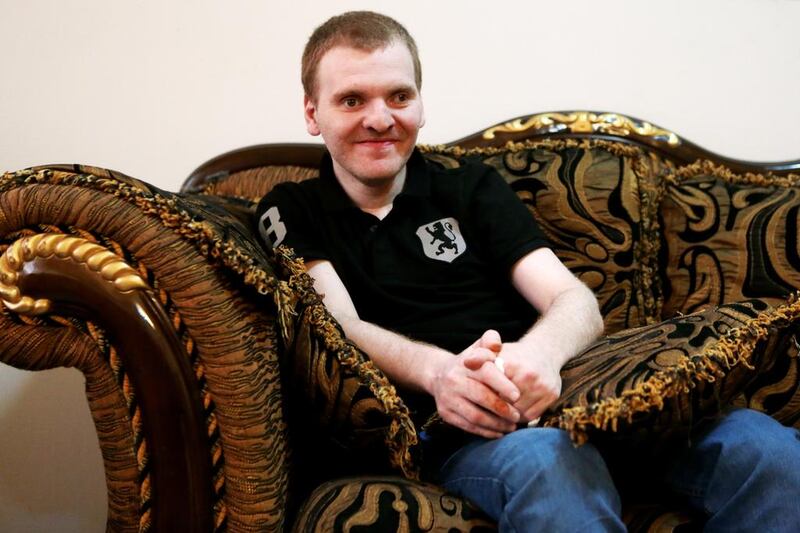ABU DHABI // In a three-bedroom apartment in Abu Dhabi, a 30-year-old Jordanian man is prisoner because of his medical condition.
The windows are barred and there is a biometric fingerprint lock on the front door so that he cannot ever leave the house on his own.
“This is what I have to do to protect my son. I have to lock my son up,” said his mother, who asked not to be named, breaking down in tears.
Her son, Zaid, has multiple sclerosis (MS) – a chronic disease that affects the nerves in the brain and spinal cord.
While thousands of MS patients worldwide can lead a relatively normal life with manageable symptoms, Zaid cannot.
The disease has attacked the frontal lobe of his brain, which has affected his movement, speech, judgment, impulse control and social behaviour.
“Zaid is my eldest son. He was my friend. I used to ask him not to call me Dad,” his father said.
He had hoped that Zaid would one day become the man of the house and take care of his other siblings. When he was 18, Zaid was a grade-A student and a star athlete playing for a national youth football team. Three years later he could not perform the simplest of tasks on his own. His hands shake, his speech is slurred and his gait is unsteady.
“Whenever he used to leave the house everyone would think he was drunk and report him to the police,” his father said.
Zaid would get arrested and a blood test would be performed to check if he was intoxicated or not. Most times, when Zaid was able to communicate with the police and give them his details, he would be taken back home, but one time he was not so lucky and ended up being deported.
His mother was frantic and suffered a nervous breakdown. “I didn’t know what to do.
“I went to every hospital and every police station in the UAE until I found out he had been deported.”
“I cannot risk that happening ever again and have locked the house so he cannot leave without one of us accompanying him,” she said.
Zaid has a history of running away and jumping out of the window when his parents are at work because his disease has affected his judgment and impulse control.
One of these falls almost cost him his life and resulted in three surgeries in various parts of his body, metal rods, screws and plates inserted in his legs and face and he lost all his teeth. Having spent all their savings on these operations, his parents could not afford to have reconstructive surgery for his teeth.
“If Zaid wants to do something. he will do it even if it will harm him or is inappropriate. If he needs to go to the bathroom, he will do it in the middle of the living room. If he wants to go out, he will do anything to leave the house and go out of the house immediately. It has to be done now for Zaid. He cannot wait a second,” she said.
“Zaid loves nothing more and all he wants to do is go out, meet people and have friends. He is so lonely. It breaks my heart to see my son like that.”
But for Zaid to leave the house, he has to wait for one of his parents to come back from work and even then it is a chore.
“He is very heavy and a grown man. I have to fully support him and almost carry him when I take him out. He cannot sit in a wheelchair because his body shakes so much,” his mother said.
His body shakes so violently that she has to lay him flat on his bed and hold his head to feed him. The food has to be puréed because he has no teeth and risks choking to death.
“Everything has to be done while he is lying down – even his baths,” she said.
The couple cannot afford a nurse and their health insurance does not cover home care.
“Every maid we hired has either quit or run away, so I do everything alone,” she said.
“We have forgotten all about our other children and dedicated our lives to taking care of Zaid. We have distanced ourselves from everyone and rarely leave the house except to go to work and return.”
Zaid said his dream was to be “free”.
With heavy slurred speech he said: “I want to live like normal people ... by talking to other people I feel normal. I know I have made it hard for my parents. I know I am a handful. I feel guilty but I can’t control myself.“
Zaid’s parents are in constant fear that their son will somehow find a way out of the house and get arrested.
“In Jordan, everyone knows us and I know if he runs away the police will call me and send him back home, but I can’t leave him in Jordan. Our life, work and children are here,” his father said.
They have asked that he be provided with an identification card so that he can be returned home if spotted.
Abu Dhabi Police said that they were trained to deal with people with MS and a range of other medical conditions.
salnuwais@thenational.ae





